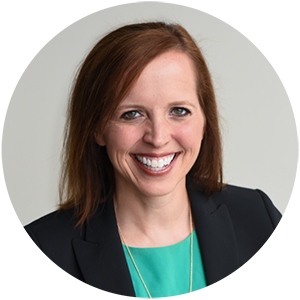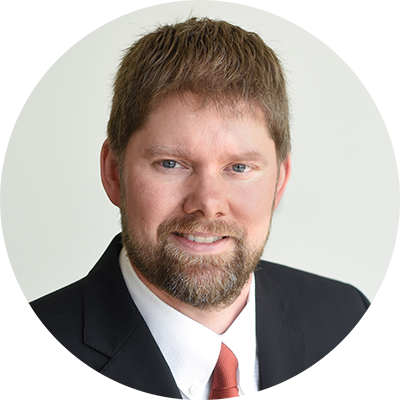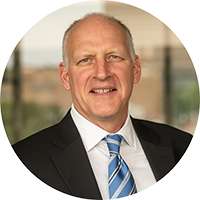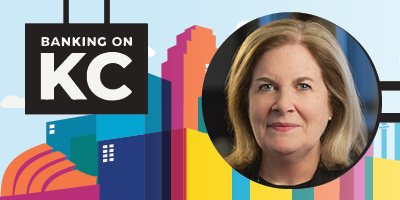The Bottom Line - Banking on Smart Planning

Banking On Smart Planning
Essential considerations in estate planning: A guide for smooth transitions
We spend a lot of time with individuals, couples, and families on wealth preservation and transfer — estate planning — and while it’s important that you work with an attorney and tax professional for the legal and tax-related aspects of the process, there are also non-legal, non-monetary aspects that may be just as important to consider.
For anyone exploring or engaged in the process, we’ve found that integrating the softer skills of estate planning, including clear communications and emotionally intelligent planning, can ensure a smoother transition and preserve family harmony.
Whether you’ve already finalized an estate plan or are just getting started, here are four aspects to consider when creating your plan.
Plan for the future, but don't forget the here and now
Focusing on the present while preparing for the future is crucial. Life is unpredictable, and circumstances can change rapidly. A well-crafted estate plan should be revisited every two to three years or whenever significant changes occur in the family, such as births, marriages, divorces, or shifts in financial status.
For business owners, this means not only considering the succession of the business but also ensuring that your current needs and your family's needs are met. Regularly updating your estate plan provides a roadmap that adapts to changing circumstances, reducing the risk of disputes and confusion among heirs.
Communication is key
Every family takes a unique approach to discussing money, preservation, and wealth transfer. Transparent communication is essential for successful estate planning. Spouses, children, and grandchildren should understand the thought process behind the plan.
Open discussions about your estate plan can help demystify your intentions and reduce misunderstandings. Families who frequently converse about plans tend to experience smoother wealth transfers. When everyone understands the plan, there's less room for disputes, especially during emotionally charged times.
Surround yourself with good people
A thoughtful, well-designed plan is a priceless gift to your family, but it requires the right team of professionals. Lawyers, CPAs, insurance professionals, trust officers, and bankers play crucial roles in estate planning. It's important to choose partners who work well with you and your family.
Consider whether these professionals will be the right fit for your surviving spouse or children. If you feel comfortable, introduce your family to your trusted advisors. This can help build a relationship that will continue after you're gone. A good partner understands the importance of getting to know the rest of the family and should be eager to meet with your children and grandchildren.
Plan for unique personal property
It's easy to focus on financial assets and overlook personal items that hold sentimental value. Though seemingly insignificant, these items can carry deep emotional significance for family members. The desk nameplate, the cookie jar, or the watch can all become sources of contention if not properly addressed.
Discuss these items with your family to understand their sentimental value. If multiple family members express interest in the same item, make a decision during your lifetime to avoid conflicts later. Allocating these personal items thoughtfully can help prevent rifts that often arise from emotional attachments to seemingly minor possessions.
The softer side of estate planning concerns more than legal documents and financial arrangements. It's about ensuring that your family's emotional needs are met and that your legacy is preserved in a way that promotes harmony and understanding.
At Country Club Trust, we've been honored to provide strategic financial guidance and estate planning services to generations, witnessing firsthand the advantages of careful planning and smooth transitions. We're ready to share this expertise and welcome the opportunity to help you achieve your financial goals and objectives, now and in the future.

— M. Suzanne (Suzy) Hall, J.D., President, Country Club Trust Company — A Division of Country Club Bank
The opinions and views expressed herein are those of the author and do not necessarily reflect those of Country Club Trust Company (CCTC), a division of Country Club Bank. Information provided including any estate planning or tax-related information does not constitute legal or tax advice; is for illustrative and discussion purposes only; should not be considered a recommendation; and is subject to change. CCTC does not provide legal or tax advice. For legal advice, including the drafting and execution of estate planning documents, and/or tax advice, the services of a competent professional person or professional organization should be sought.
Economic Insights
Inflation continues to recede, GDP rises, but rate cut timing is still in question
Inflation in June rose 3 percent from a year ago, down from a 3.3% rate in May. After excluding food and fuel prices, the “core” price index rose by 3.3% compared to a year earlier, showing a decline from the previous report. Prices decreased by 0.1% monthly, with the core index rising only slightly.
This cooling inflation data indicates a meaningful slowdown in inflation, which is precisely what Fed officials have been hoping for as they consider cutting interest rates. The central bank has maintained borrowing costs at 5.3% for the past year to reduce the demand for big purchases like houses and cars.
However, this decline in inflation has spurred discussions among economists and investors about the potential timing of interest rate cuts.
Despite the positive inflation data, Fed Chair Jerome Powell has remained non-committal about when the central bank might begin to lower interest rates. During a recent speech at the Economic Club of Washington, Powell refrained from giving clear signals, emphasizing that decisions will be based on incoming data rather than predetermined timelines.
Other good news that argues against an impending recession, though it may not convince the Fed to cut rates, is the most recent report from the Commerce Department showing that GDP rose at an annual rate of 2.8%. The second-quarter acceleration easily beat the 2.1% expected by economists. Current third-quarter Atlanta Fed GDPNow estimates stand at 2.8%.
On the labor front, recent figures show a cooling market as well, with a slight uptick in the unemployment rate, which rose to 4.1% in June from 3.4% in early 2023. Fed officials have highlighted the importance of closely monitoring employment trends to avoid over-tightening monetary policy, which could increase the risk of recession.
But Fed board members are sticking to the script of the importance of data over specific timelines. Some have even noted the need for continued caution due to the nuanced nature of current economic conditions, referring to atypical business cycles that have complicated economic predictions.
Supply chain disruptions, geopolitical tensions, and fluctuations in commodity prices continue to play major roles as well and have added layers of complexity to the Fed's policy decisions.
Bottom Line: While the exact timing of a rate cut remains uncertain, many economists and investors are looking to the Fed's September meeting as a potential inflection point. However, Powell and other Fed officials have indicated they will not rush into a decision. The focus remains on achieving a balance between controlling inflation and maintaining a robust job market.
In the big picture, as inflation gradually eases and the Fed takes a careful approach to interest rate cuts, everyone—consumers, investors, and employers—will need to stay on their toes in this dynamic dance with the economy, which continues to prioritize stability over scheduling.

— Marcus Scott, CFA, CFP®, Chief Investment Officer (CIO) for Country Club Trust Company
CFA® and Chartered Financial Analyst® are registered trademarks owned by CFA Institute.
Certified Financial Planner Board of Standards Inc. (CFP Board) owns the certification marks CFP®, CERTIFIED FINANCIAL PLANNER™, CFP® (with plaque design), and CFP® (with flame design) in the U.S., which it authorizes use of by individuals who successfully complete CFP Board's initial and ongoing certification requirements.
The opinions and views expressed herein are those of the author and do not necessarily reflect those of Country Club Trust Company, a division of Country Club Bank, or any affiliate thereof. Information provided is for illustrative and discussion purposes only; should not be considered a recommendation; and is subject to change. Some information provided above may be obtained from outside sources believed to be reliable, but no representation is made as to its accuracy or completeness. Please note that investments involve risk, and that past performance does not guarantee future results.
Client Success Story
CyTek elevates outsourced IT services with capital — and collaboration — from Country Club Bank
 Chris Burcham, President and CEO of CyTek, a Kansas City-based provider of managed IT services and support, wants his firm to be known for much more than the traditional break-fix solutions and basic IT functions the company was founded on nearly 30 years ago.
Chris Burcham, President and CEO of CyTek, a Kansas City-based provider of managed IT services and support, wants his firm to be known for much more than the traditional break-fix solutions and basic IT functions the company was founded on nearly 30 years ago.
Since Chris and his family bought CyTek in 2021, they’ve aggressively worked to expand the company’s capabilities and elevate the customer experience through strong relationships, expert knowledge, and superior service.
“We want to be known for much more than software installations and hardware problems,” Chris said. “Our mission is to support a client's strategic direction and growth by providing consultative, tailored solutions designed for modern IT environments.”
Chris said building relationships and creating remarkable client experiences at CyTek is a priority because it’s a formula that works. It also runs in the family.
 Chris’s father, Grant Burcham, who serves as Chairman of CyTek, spent the majority of his 35-year career building the Burcham family-owned community bank Mobank into an attractive acquisition target that was sold to BOK Financial in 2016.
Chris’s father, Grant Burcham, who serves as Chairman of CyTek, spent the majority of his 35-year career building the Burcham family-owned community bank Mobank into an attractive acquisition target that was sold to BOK Financial in 2016.
Since exiting the family banking business, Chris and Grant have turned to Country Club Bank for business financing and working capital credit lines.
“Knowing what I do about banking and local lenders, I wouldn’t be anywhere else but Country Club Bank,” said Grant. “They are constantly analyzing what’s responsible for the bank, what’s right for the customer, and what’s good for the community.”
As if being a loyal client wasn’t enough, Grant even serves on the bank's Board of Directors, routinely sharing his experience and insights gained from his accomplished career in community banking.
Chris said his relationship with Country Club Bank was cemented in 2019 when he met with local lenders about a loan to buy another business.
“It felt like other banks were grilling me,” said Chris. “But with Country Club Bank, it was more of a conversation that quickly became a collaboration. I had a term sheet the next day.”
Chris said the relationship works well because of shared values and operating principles.
 “Country Club Bank has been more than a financier; they’ve been a true partner in our growth journey,” Chris said. “The experience has been so positive that continuing that partnership has made perfect sense.”
“Country Club Bank has been more than a financier; they’ve been a true partner in our growth journey,” Chris said. “The experience has been so positive that continuing that partnership has made perfect sense.”
Looking ahead, CyTek plans to continue its growth trajectory, with potential acquisitions on the horizon. The company also aims to enhance its service offerings, particularly in high-demand compliance and assessment areas.
Chris expects Country Club Bank to play a significant role in its future growth.
“Teamwork and mutual support have been a constant in this relationship,” said Chris. “I wouldn’t want to work with anyone else.”
Banking on Relationships
KCBJ Guest Column: Unlocking the power of strong — and local — banking relationships
 In a recent Kansas City Business Journal article, Joe Close, President of Country Club Bank, highlights seven key advantages of working with community banks.
In a recent Kansas City Business Journal article, Joe Close, President of Country Club Bank, highlights seven key advantages of working with community banks.
Close writes that personalized service, local expertise, flexible solutions, and community investment allow community banks to offer a relationship-driven approach that goes beyond mere transactions. Locally owned and operated banks understand the unique needs of local businesses and are deeply invested in the economic health of their communities.
Learn how partnering with a community institution like Country Club Bank can fuel growth and build your network of trusted advisors. Read the full article here and discover how good community banking could be for your business.
Banking on KC Podcast
Tune In: Experience and Insights from Esther George's 40 years at the Fed
 Tune in to the latest Banking on KC podcast episode, where Kelly Scanlon hosts an insightful conversation with Esther George, former President and CEO of the Federal Reserve Bank of Kansas City.
Tune in to the latest Banking on KC podcast episode, where Kelly Scanlon hosts an insightful conversation with Esther George, former President and CEO of the Federal Reserve Bank of Kansas City.
With over 40 years of experience at the Federal Reserve, Esther George shares her invaluable perspectives on several critical topics.
One of the key highlights is the evolution of the Federal Reserve's role in response to significant economic crises and technological advancements. George emphasizes how technology has transformed the Federal Reserve's operations, particularly in its collaboration with regional banks, and how the development of tools to address crises like the 2008 financial meltdown and the recent pandemic have led to increased stability and risk mitigation.
Another significant point George discusses is the vital role of community banks in the economic ecosystem. She underscores how these banks contribute to economic diversity, providing crucial credit and fostering personal customer relationships. This local presence and deep understanding of community needs make community banks indispensable in maintaining financial sustainability and growth.
Finally, George introduces us to the FedNow Service, a groundbreaking initiative she worked on during her tenure. This service aims to modernize the U.S. payment system by enabling real-time transactions, benefiting small businesses and individuals by improving cash flow and financial efficiency.
Take advantage of Esther George's profound insights and wisdom on adapting to the ever-changing financial landscape. Listen to the full episode here or scan the transcript to understand better the economic forces shaping our world.
Newsletter Sign-Up